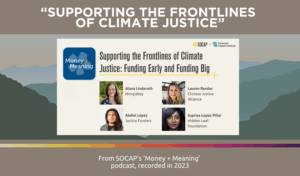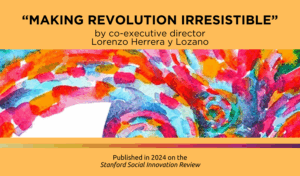Just Transition: Liberating Finance to Build a Better World series with Nonprofit Quarterly
A 2024 collaboration with Nonprofit Quarterly, Just Transition: Liberating Finance to Build a Better World is a series of articles that highlights case studies of emerging funding networks that facilitate investments in liberatory economic practices across BIPOC and working-class communities. Articles include:
- Regenerative Housing Initiatives: From Private Equity to Community Ownership by Fernando X. Abarca
- Reclaiming Land Ownership in Black and Indigenous Communities by Melanie Allen and Jaime Gloshay
- New Approaches to Investment: Toward a Regenerative, Solidarity Economy by abdiel j. lópez
- How to Flip the Script on Foundation Reporting by Lora Smith
- Building Our Power: Advancing Climate Justice through Regenerative Finance by Jessica Xiao and Lauren Ressler
You can also watch an accompanying webinar: Remaking the Economy: Liberating Finance to Build a More Just World
![]()
“Reimagined Economies:” from the Scene on Radio podcast
In “Reimagined Economies,” the Season 7 finale of the Scene on Radio podcast, Justice Funders’ Co-Executive Director, Dana Kawaoka-Chen, was interviewed alongside Justice Funders’ Board Co-Chair, Mateo Nube of Movement Generation, Regan Pritzker of the Kataly Foundation, and Corrina Gould of the Sogorea Te Land Trust. They talked about how being in right relationship with each other and the land is creating a growing practice of interdependence between organizations and new solidarity economy projects.
![]()
“Achieving a Just Transition to a Regenerative Economy:” from the Do Your Good podcast
In 2024, Justice Funders’ Senior Director of Practice Acceleration Rachel Humphrey was invited to discuss the challenges and opportunities in transitioning from extractive to regenerative practices, offering guidance and inspiration for those committed to creating a more just world. You can listen here.
![]()
“Supporting the Frontlines of Climate Justice: Funding Early and Funding Big” from the Money + Meaning podcast
Director of Capital Activation abdiel j. lópez joined Lauren Ressler of Climate Justice Alliance and Supriya Lopez Pillai of Hidden Leaf Foundation for a conversation about collective efforts to reimagine and redefine impact investing to support community wealth creation and strategies to mitigate climate change. Their conversation was recorded onsite during SOCAP23.
![]()
Making Revolution Irresistible: Stanford Social Innovation Review
Written by Co-Executive Director Lorenzo Herrera y Lozano, this 2024 article shares the (Re)Generative Leadership Framework, a strategic move from management to co-stewardship and an explicit shift from control and compliance to intrinsic motivation and engagement.
It’s Not Your Money podcast with abdiel j. López (2023)
Cambelback Ventures’ Capital Collaborative Funder In Residence, Jessamyn Shams-Lau, talks with abdiel j. lópez from Justice Funders, to share what a ‘Just Transition’ for philanthropy looks like, how some funders are already moving their power to communities, and how anyone can take steps towards healing and community-centered practices.
Next Economy Now podcast with abdiel j. lópez: Exploring the Just Transition Investment Framework (2023)
abdiel j. lópez, the Director of Capital Activation at Justice Funders, discusses the Just Transition Investment Framework, delving into the concept of community-controlled institutions, the definition of value-aligned business practices, shifting capital and power to build a regenerative economy, challenging traditional approaches to philanthropy, popularising the concept of restorative economics, and much more.
Philanthropy, Social Justice and Shifting Power
By Michael Hamill Remaley, Inside Philanthropy | October 13, 2022
“While I’m definitely heartened by more funders having an interest in practices like trust-based philanthropy, I see trust-based philanthropy as [just] an entry point to the redistribution of wealth,” said Dana Kawaoka-Chen, co-director of Justice Funders. “However, we have yet to see broader adoption in the transfer of decision making from philanthropic institutions to communities, so further assessment on the kinds of interventions that result in structural change to who has power and control over how philanthropic assets are distributed would be helpful.”
“Dana Kawaoka-Chen of Justice Funders identified another gradation, asserting that a higher order within the justice category comprises those projects that specifically pursue an anticapitalist agenda.”
How Fundraising Can Bring Americans Back to Giving — if It Changes
By Drew Lindsay, Chronicles of Philanthropy | July 12, 2022
“Foundations deserve a lot of blame for the disconnect with donors, says Mario Lugay, senior innovation director for Justice Funders, which supports philanthropy to advance social justice. In the past few decades, Lugay argues, grant makers have invited nonprofits to turn to them for help, to stop chasing small-dollar gifts. Foundations now account for almost one out of every five dollars given to charity, according to “Giving USA,” up from just 6 percent in the early 1980s.
“This spring, the magazine shifted donor communications in another small but symbolic way. With help from Justice Funders, which supports philanthropy focused on social justice, the magazine discarded its form gift-acknowledgment letter — a “Mother Jones-centric” message that “regurgitated the mission statement,” according to Cathy Asmus, then the magazine’s membership initiatives manager.”
A Growing Number of Bay Area Foundations Are Paying “Land Taxes” to Native Peoples
by Michael Kavate | April 26, 2022
One institution has been particularly active in spreading the word in philanthropy about land taxes: Justice Funders, whose Oakland headquarters are on unceded Lisjan Ohlone territory. The grantmaker network started paying Shuumi last year, and as part of its broader mission, has been working ever since to invite others to do the same.
“Slowly, we have been seeing some traction, where more and more foundations are beginning to pay the tax,” said Maria Nakae, senior engagement director at Justice Funders, who calls it a “moral obligation” for philanthropy. Nakae helped launch the campaign to inform foundations about Shuumi alongside Luckey, Paola Diaz of 11th Hour Project and Kathryn Gilje of Ceres Trust, who co-chairs Justice Funders’ board.
Social Justice Philanthropy Restructures to Focus on Power
by Louise Lief, Inside Philanthropy | February 12, 2020
“For Justice Funders, equity is not an end goal but a step on the road to ‘liberation’ from extractive and exploitative systems. Many foundations will find their current practices described as ‘extractive’ or ‘less extractive’ in Justice Funders’ framework. In the final ‘regenerative’ stage, ‘wealth is redistributed, power is democratized and economic control is shifted to communities.’”
Balance of Power: A group called Justice Funders wants to democratize grant making and give more control to recipients
by Alex Daneils and Ben Gose, The Chronicle of Philanthropy | April 2, 2019
“There needs to be a shift from wealth and power being accumulated within institutions toward a new vision where philanthropy is about redistributing wealth, democratizing power, and shifting economic control to the community…Often foundations can extract labor and extract resources more than they are putting in. For justice and liberation to be truly achieved, we need to rethink the way that philanthropy as a field actually exists.”
What Do Our Times Require? Funders Propose a Philanthropic “Green New Deal”
by Jeanne Bell, Nonprofit Quarterly | March 12, 2019
Last month, more than 150 people crowded into a standing-room-only event in Oakland, California. Hosted by Justice Funders, which describes itself as “a partner and guide for philanthropy in reimagining practices that advance a thriving and just world,” the convening had a decidedly activist orientation. Speakers and participants were not there to talk about doing charity well, but rather about transforming philanthropy to its core.
Next Economy Now podcast with Dana Kawaoka-Chen: Justice Funders’ vision for philanthropic transformation (2019)
In this episode, Dana Kawaoka-Chen of Justice Funders examines the problematic roots of philanthropy & re-imagines a more values aligned system. Share discussed the recently released publication by Justice Funders, Resonance: a Framework for Philanthropic Transformation, which articulates what a Just Transition can look like for philanthropy
Beyond Equity, Toward Liberation
by Dana Kawaoka-Chen / March 7, 2019
“We can remain satisfied with the goal of achieving equitable health outcomes within an extractive economic system that will continue to endlessly harm low-income communities and communities of color, in which we will always have another battle to fight. Or we can expand our imaginations to liberate ourselves from the extractive economic system altogether, and proactively work to build a society that inherently values the health and well-being of all people and the planet we live on.”



